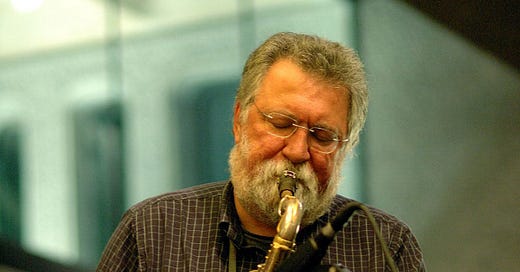Evan Parker/Barry Guy/Paul Lytton
One of Europe's great improvising groups invites guests to the party
Evan Parker is an absolute legend of avant-garde improvised music. He was one of the founders of the Incus label along with guitarist Derek Bailey and drummer Tony Oxley; they were interested in exploring the farthest limits of improvisation, not just as an artistic strategy but as a philosophy and a raison d’être. At least that was the legend, bolstered by the face-shredding first Incus release, The Topography of the Lungs (featuring Han Bennink on drums), never mind Parker, Bailey, and Bennink’s playing on Peter Brötzmann’s Nipples and its companion piece, More Nipples.
In truth, though, Bailey came out of playing in pubs and playing with dance bands, and had a great affection for early jazz even if he used to like to wind up interviewers by claiming that jazz had died by 1953. Oxley was one of the most in-demand jazz drummers in London during the 1960s. And Parker uses composition just as easily and skillfully as improvisation.
He said in a 2010 interview, “there’s always been that tracking going on between jazz and notated music, music coming out of the European tradition (what do we call it? Conservatory music?). It doesn't matter how far you go back with jazz, there’s always been a parallel thing with renegade conservatory players, people like Lukas Foss, the Gruppo di Improvisazione Nuova Consonanza… were we copying them? Did we accept certain givens of the language of new music already created by the generation before? I think you steal like a magpie from everywhere, and I think if you have a larger context in which you can embed your stolen fragments, or a kind of armature you can hang all the bits and pieces on so it looks like your work, well, you’ve done well. If all you ever seem to be doing is quoting or referencing pre-existent formulae or solutions to problems, then you look like a pasticheur.”
He added, “For me, improvisation is a compositional method, and notation is a compositional method, and if you can accept that there are strengths and weaknesses that come with both things, then all the apparent problems …all disappear. Obviously, if you improvise your music there’s going to be a higher degree of redundancy, you’re going to repeat yourself. When you have ‘all the time in the world to write fifteen minutes of music’ you can make sure you don’t repeat licks you used last time. But it’s a question of… notation suits the lonely character who sits in his room and who can take a lot of time to revise, edit, be rigorous and totally absorbed in what he’s doing.”
Since the 1970s, Parker has been part of two key trios: pianist Alexander von Schlippenbach’s group with drummer Paul Lovens, and his own unit with bassist Barry Guy and drummer Paul Lytton. The Parker/Guy/Lytton group has recorded nearly 20 albums, some including special guests. Three of these records are part of the Leo reissue program, and are available now on Bandcamp.
Natives and Aliens is a studio recording from May 1996 that features Parker on tenor and soprano saxophones, Guy on double bass and piccolo bass, Lytton on percussion, and Marilyn Crispell on piano. Its 10 tracks range from under two to nearly 11 minutes in length, and while they are “free” in structure and timbre, it’s obvious that all three players are using jazz language to one degree or another. Crispell’s post-Cecil Taylor romanticism blends very well with Parker’s blustery but surprisingly sensitive explorations, and Guy and Lytton, while never functioning as a mere “rhythm section”, do manage to keep things on track in some unpindownable way.
The four of them reunited three years later, in June 1999, for After Appleby, a double disc that combined roughly an hour of studio work with a nearly 70-minute live performance. The language they established together on Natives and Aliens is even deeper and more expressive here. On the 20-minute “Blue Star Kachina”, Parker takes off on a seemingly endless soprano saxophone flight, circular breathing for all he’s worth, as Crispell creates dark rumbles beneath him, Guy bows like a groaning revenant, and Lytton’s cymbals rattle like shutters in a hurricane.
The third Leo release I want you to know about today is the monumental 2 x 3 = 5, a 77-minute performance by a once-in-a-lifetime combination of the Parker/Guy/Lytton trio and the Alexander von Schlippenbach Trio. The two Pauls, Lovens and Lytton, rise and fall like an oceanic tide of percussion as Guy booms in the middle of the storm being brewed by Parker and Schlippenbach. This is Parker in pure free jazz mode, attaining nearly Brötzmann-ian heights at times and letting his lines out in long, heavy lungfuls of notes.
This type of music is often described as “not for the faint-hearted” or whatever. I disagree. It may not have the handholds that pop songs offer — it never repeats itself, and the pieces can be quite long — but if you treat it like a journey, and leave yourself open to the possibility of hearing something really exciting, even if it only lasts a few seconds, I think you’ll be glad you did.
Visit evanparkerleo.bandcamp.com to check out Natives and Aliens, After Appleby, and 2 x 3 = 5, and I’ll see you next week, when we’ll be talking about John Zorn’s PainKiller!





Beautiful stuff. That's a nice quote there from Evan Parker from a 2010 interview. I found the source here: https://www.paristransatlantic.com/magazine/interviews/parker.html
All the albums mentioned are in my wish list. I can't wait to read about PainKiller!